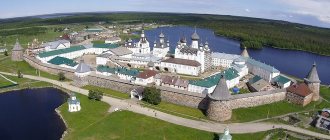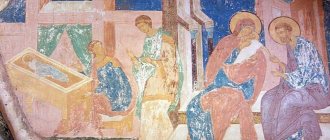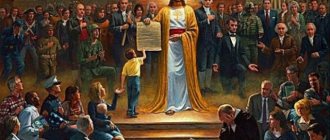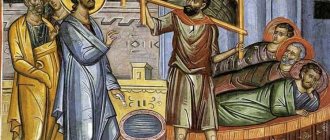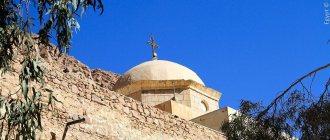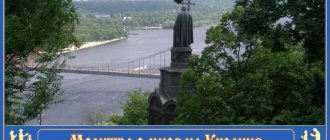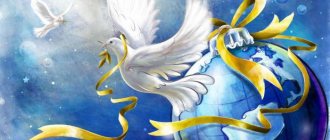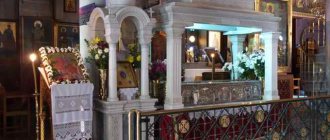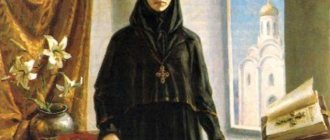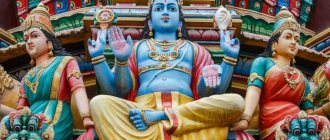Establishment of the festival
In the distant 4th century, a false teaching began to spread: heretics appeared among Christians who worshiped Angels as gods and taught that the visible world was created not by God, but by Angels. This teaching was so dangerous that the holy fathers were forced to convene a Local Council in Laodicea. The Council of Laodicea, by its 35th canon, condemned and rejected the heretical worship of Angels as rulers of the world and approved their Orthodox veneration. It was also established to celebrate the Council of the Archangel Michael and other Heavenly Powers on November 21 (November 8, O.S.).
The date was not chosen by chance. November is the ninth month after March, from which in ancient times the year began - in accordance with the number of nine angelic ranks. The eighth day of the month (according to the old style) indicates the future Council of all the Heavenly Powers on the day of the Last Judgment of God, which the holy fathers call the “eighth day.” Having appointed a festival in honor of the angelic forces for November 8, the Church especially emphasized that the Angels will be witnesses before God for us at the Last Judgment.
Bible stories[edit]
Depiction of the commander-in-chief of the Lord's army in Joshua 5, Ferdinand Bol, 1642.
In the Hebrew Bible, the name Yahweh and the title Elohim are often found with the word tsevaot
or
sabaoth
("hosts" or "armies", Hebrew: צבאות) as YHWH Elohe Tzevaot ("YHWH God of Hosts"), Elohe Tzevaot ("God of Hosts"), Adonai YHWH Tzevaot ("Lord YHWH of Hosts") or, more commonly in all, YHWH of Hosts ("YHWH of Hosts"). This name is traditionally transliterated in Latin as Sabaoth, a form that will be more familiar to many English readers as it was used in the King James Version of the Bible. [1]
In Joshua 5:13–15, Joshua encounters the "chief of the army of the Lord" in the early days of his campaigns in the Promised Land. This nameless heavenly messenger is sent by God to encourage Joshua in his upcoming claim to the Promised Land:
One day, when Joshua was near Jericho, he looked and saw a man standing before him with a drawn sword in his hand. Joshua approached him and said to him, “Are you one of us or one of our adversaries?” He replied: “Neither one nor the other; but now I have come as commander of the army of the Lord.” And Joshua fell on his face to the ground and worshiped, and he said to him: 'What do you command your servant, my Lord?' The commander of the Lord’s army said to Joshua, “Take off your sandals from your feet, for the place where you stand is holy.” That's what Joshua did.
- Joshua 5:13–15 (NRSV)
Archangel Guido Reni Michael.
In the Book of Revelation, Satan's rebellious forces are defeated by the heavenly host led by Archangel Michael during the War in Heaven (Rev. 12:7–9).
Heavenly hierarchy
“The business of Angels is to glorify God,” writes St. Basil the Great. By their nature, Angels are active spirits with intelligence, will and knowledge. The word "angel" means messenger. Many times they appeared in a visible way, taking on a bodily form, when God sent them to people to proclaim His Will. Being disembodied, Angels are less dependent on distances and places than people. They quickly move through the heavens, appearing where they should act.
The Lord established an amazing order in this Heavenly Host, creating an angelic hierarchy. All Angels are divided into nine ranks of three ranks in a hierarchy, where the lower ones are subordinate to the higher ones. Saint Dionysius the Areopagite described all nine ranks of Angels in his book “On the Heavenly Hierarchy.”
The first, highest triad consists of Seraphim, Cherubim and Thrones . These Angels are in close proximity to God, “as if on the threshold of the Divinity.” The word "Seraphim" means "flaming." The Church says about the Seraphim that they are “the very heavenly expression of Divine love.” Therefore, they are depicted near the throne of the Almighty in the form of creatures with a human face surrounded by six red wings. The red color is here as a symbol of fiery love for God.
The word “Cherub” translated from Hebrew means “wisdom.” Cherubim, possessing the highest spiritual wisdom, are depicted on icons as a human face surrounded by six or four blue or green wings. Cherubim stand before the Throne of God.
The same highest category includes Thrones - spiritual beings who are often depicted holding the Throne on which the Lord Himself sits.
The middle angelic triad consists of Dominions, Powers and Powers. This hierarchy especially fully reflects the principle of Divine world dominion.
Dominions communicate the will of God, lead earthly rulers to its fulfillment, and help the mighty of this world dominate their evil intentions. The powers send down the grace of miracles and clairvoyance to the holy saints of God. From Tradition we know that it is the Angels of Power who meet the human soul after death. Authorities help the human race to rule over its passions.
The lower angelic triad includes the Principalities, Archangels and Angels . This triad is distinguished by its immediate proximity to the world and man.
The principles govern the natural elements. They rule over the lower Angels, directing them to fulfill Divine commands. They are entrusted with managing the Universe, protecting countries, peoples, tribes. They began to teach those in command to perform official duties not for the sake of personal glory and benefits, but for the sake of the Glory of God and the benefit of their neighbors.
The Archangels preach “great and glorious things,” reveal the mysteries of faith, prophecies and understanding of the will of God, strengthen people’s faith, enlightening their minds with the light of the Holy Gospel.
Angels are closest to people. They proclaim God's intentions and instruct people to lead a virtuous and holy life. God gives every Christian a Guardian Angel at Baptism, who invisibly helps a person throughout his entire earthly life. Angels protect believers, keep them from falling, raise the fallen and are always ready to help if we wish.
Most art historians and theologians explain that the wings that we see on Angels on icons symbolize the speed with which they come to this world and bring news of the will of God.
We crossed the snow-covered steppe of the Saraktash region, lifeless as space, in the absolute blackness of an early winter morning. The snowstorm covered its tracks, and a hurricane wind threatened to blow the car off the road. We walked according to instruments. “After all, the Ministry of Emergency Situations announces storm warnings not for fun,” I thought through the falling sleep. “I’ve been wanting to come here for a long time, and now I’ve chosen the time...” “It seems we’re there,” said the driver Vitaly, taxiing up the hill, dimming the headlights.
An illuminated temple could be seen in the inky darkness. He hung in space like an orbital station. St. Andrew's Monastery.
In order to understand the way of life and thoughts of a monk, you need to be one. Believe me, reader, prayer, thoughts, the struggle inside another person is a universe that we are not given the opportunity to fly through. Everyone has their own path here. I came here shortly before the Epiphany of the Lord in order to at least just SEE.
In the understanding of many, a monastery is a building with cramped stone cells underground, sparingly lit by a candle stub, where water drips from the ceiling, and in the middle sits a continuously praying hermit with an ancient Gospel, who has not seen the white light for years. It's not like that at all. Despite the purpose of this place, I saw that something was happening around me every minute. Divine services in the temple twice a day: morning from 7 to 10 and evening from 17 to 20, and between these events the inhabitants of the monastery have a lot to do.
First of all, remove the snow: if you miss a day, you won’t be able to dig out, bake bread, prepare food for the brothers (monks do not eat meat, only fish), clean the cells, work in the carpentry shop, continue painting the temple, and much more.
Idleness, the mother of many sins, does not live here. It’s just that these people perform any action while continuously praying. This makes the food tastier and the face painted on the wall of the temple more beautiful.
Only older brothers and young people – not-yet-decided novices – use mobile phones. Most of them voluntarily give them to the abbot, because there is always a temptation to talk with friends, and calling home, as they say here, is not useful, because this is not what a person who has dedicated his life to serving God begins to think about. The Internet, as one of the brothers told me, is “bad by God’s grace,” so emails are sent exclusively from a smartphone for business reasons.
However, all these troubles seem to fringe the main value of this place - the people. I talked with the monks about many things - the newspaper is not enough, so I will give only some excerpts from our conversations.
Hegumen Eulogius
, abbot of the St. Andrew's Monastery, monk:
– In my past life, I was interested in a lot of things. At 14, I assembled mopeds with my own hands, then studied various types of martial arts, most of all wushu, for about three years. Everything worked out, but everything quickly became boring, and more and more quickly as time went on. He entered and graduated from the Saratov Conservatory. It was during that period that I became a believer. I liked the services, I loved singing in church. When I first entered the monastery, I had no plans to become a monk. I thought that this was not for me, that it was all too serious, but a month, six months, a year passed. And the services were hard, from five in the morning, seven days a week, but I found that it didn’t get boring, which I really liked. I felt that there was something to live for.
Hieromonk Father Dionysius
:
“You don’t just become monks.” Only by vocation. God calls.
I entered the art school in Yekaterinburg when I was very young, and it’s good that it shaped me then and gave me an orientation towards art. When I paint an icon, I pray, it brings me satisfaction. And I also have my own interest in this: I paint icons for people, they will pray, maybe they will remember me. Well, if not them, then the saint whose face I painted will be remembered. After all, every time I create, I get in touch with the one I am writing, and it is clear that I also enlist his prayerful help. We also sing in the choir. And if you sing something Byzantine, sometimes Byzantine mosaics appear before your eyes. The antiquity of Christianity comes to life. Living in a monastery is difficult, but interesting. The difficulty lies in the struggle with your passions, with your weaknesses, with your fallen nature. And when we see how the Lord wins in us, it strengthens our faith.
Father Barnabas
: – Monks are people who have set themselves the goal of saving their souls. This is the most important thing for us, and the form of monastic life that has existed since the 4th century is as close as possible to solving this problem. If the main thing for you is to earn money, this is not the place for you, we take a vow of non-covetousness; If you want pleasure, then again, we keep ourselves strict. We are forbidden to marry. People come to the monastery for salvation, because there is much in the way of things in the world. I taught foreign languages at a pedagogical institute. You start fasting, and people look at you askance. Then they ask, why did you grow a beard? You want to pray, but you have work, different responsibilities, you must go to the dacha on Sunday.
Therefore, when I first visited Optina Pustyn, it seemed to me that it was heaven on earth. As soon as I crossed the threshold, my soul said to me: “Well, finally. I've always wanted to come here. And you’ve been dragging me around for 30 years in an unknown place...” There was a feeling that I had finally come home and didn’t want to leave anywhere. People get here in different ways, but usually it is the Lord's call. Most often this is dictated by some life circumstances. Mine were mournful, but it was then that I realized God not as an abstract idea, but as a person. Sometimes, while doing my obedience here, I make cards for Christmas or Easter and use a camera. Of course, this is not basket weaving, as in ancient times. After all, the main thing in monastic work is that it is not creative, that the mind is free for prayer and the hands are busy. On the other hand, I treat all this technology like a hammer or a shovel, as tools. Moreover, obedience, the basis of monastic life, forgives a lot, it leads to humility, and humility is the main virtue, without which the path to the Kingdom of Heaven is impossible.
Closing the door to my cell behind me, I looked for a long time and aimlessly at the white mountains. The words of the monks sounded in my head, but most of all I remembered their faces. Spiritualized, wise with experience, KNOWING. And eyes open to the world. They are still in front of me.
The novices again dug up the road to the temple. It often snows in this place in winter, even when it is quiet a few kilometers from the monastery. Seeing me off, one of the monks said: “You come here without a camera. Pray".
And the car of our editorial driver Vitaly, who was supposed to leave me at the monastery and return to Orenburg, was blown to the side of the road by the wind. They pulled it out with a tractor. He returned to my monastery again and did not dare to go further. Element. And I also know one thing for sure: wherever I am, no matter who wins in my soul, there, among the snowy steppe, the monks, despising vanity, pray for me.
Oleg RUKAVITSIN, Photo by the author
Literature
- Dionysius the Areopagite
[vehi.net/areopagit/nebesnaja.html About the heavenly hierarchy]. - Ivanov M. S.
[www.pravenc.ru/text/155128.html Heavenly Host] // Orthodox Encyclopedia. - M., 2006. - T. 9. - P. 209-210. — ISBN 5-89572-017-X.
- Kvlividze N.V.
[www.pravenc.ru/text/149329.html Blessed is the army of the Heavenly King] // Orthodox Encyclopedia. - M., 2005. - T. 5. - P. 324-325. — ISBN 5-89572-017-X. - Lepakhin V.V.
[www.pravoslavie.ru/jurnal/299.htm The army in ancient Russian literature and icon painting. Part 2] // Orthodoxy.Ru. — March 3, 2005. - Emil G. Hirsch
[jewishencyclopedia.com/view.jsp?artid=939&letter=H Host of Heaven] // Jewish Encyclopaedia. - [www.angelologia.it/angelologia.it]
- [angelologia.ru/angelologia.ru]
